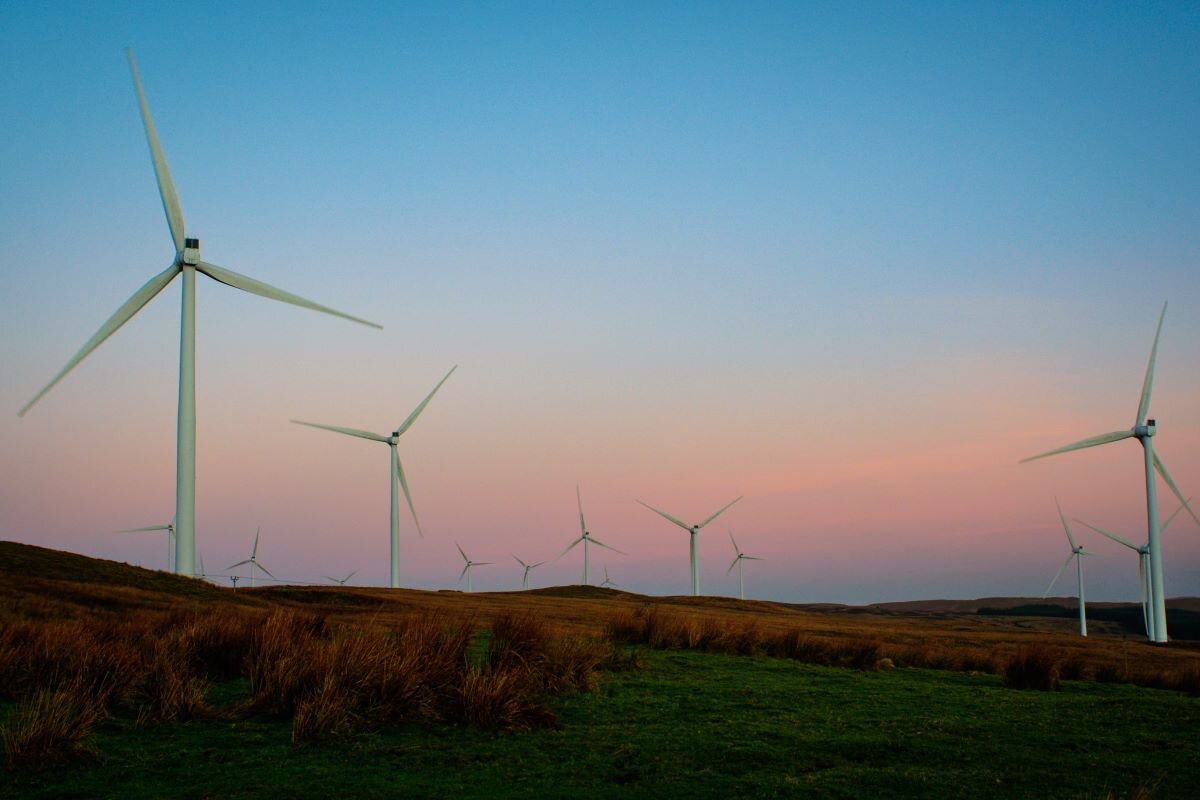The UK’s energy secretary, Ed Miliband, has revealed a bold national plan to switch to sustainable electricity by 2030.
The goal of the plan, which has been heralded as the most revolutionary overhaul of the nation’s energy system in years, is to address the climate catastrophe, secure energy independence, reduce costs, and generate jobs.
According to a UK government statement, one essential component of the plan is to streamline the electrical grid connection procedure, which will prioritize ready-to-go projects.
The new structure will deprioritise slow-moving or halted initiatives, eliminating unviable projects from the pipeline and shortening timetables for crucial advancements.

To expedite critical projects, the government will introduce the Planning and Infrastructure Bill, which will provide clarity on the country’s energy mix at both the national and regional levels.
Revised National Policy Statements for Energy will guide planners in delivering the essential clean power and infrastructure.
Furthermore, communities that host renewable energy infrastructure would benefit immediately, increasing local support.
Miliband declared that onshore wind farms greater than 100MW in England would be classified as Nationally Significant Infrastructure Projects (NSIPs), allowing them to be developed more quickly.
Ed Miliband described the initiative as a pivotal moment in Britain’s energy future, stating: “A new era of clean electricity for our country offers a positive vision of Britain’s future with energy security, lower bills, good jobs, and climate action. This can only happen with big, bold change.”
The energy secretary emphasised the importance of utilising Britain’s natural resources, saying: “The era of clean electricity is about harnessing the power of Britain’s natural resources so we can protect working people from the ravages of global energy markets.”
The Department for Energy Security and Net Zero echoed this sentiment, asserting that the plan would prioritize the nation’s energy needs and deliver homegrown clean power.
Miliband framed the clean power sprint as a fight for national security, economic stability, and social justice.
The UK’s energy secretary, Ed Miliband, has revealed a bold national plan to switch to sustainable electricity by 2030.
The goal of the plan, which has been heralded as the most revolutionary overhaul of the nation’s energy system in years, is to address the climate catastrophe, secure energy independence, reduce costs, and generate jobs.
According to a UK government statement, one essential component of the plan is to streamline the electrical grid connection procedure, which will prioritize ready-to-go projects.
The new structure will deprioritise slow-moving or halted initiatives, eliminating unviable projects from the pipeline and shortening timetables for crucial advancements.

To expedite critical projects, the government will introduce the Planning and Infrastructure Bill, which will provide clarity on the country’s energy mix at both the national and regional levels.
Revised National Policy Statements for Energy will guide planners in delivering the essential clean power and infrastructure.
Furthermore, communities that host renewable energy infrastructure would benefit immediately, increasing local support.
Miliband declared that onshore wind farms greater than 100MW in England would be classified as Nationally Significant Infrastructure Projects (NSIPs), allowing them to be developed more quickly.
Ed Miliband described the initiative as a pivotal moment in Britain’s energy future, stating: “A new era of clean electricity for our country offers a positive vision of Britain’s future with energy security, lower bills, good jobs, and climate action. This can only happen with big, bold change.”
The energy secretary emphasised the importance of utilising Britain’s natural resources, saying: “The era of clean electricity is about harnessing the power of Britain’s natural resources so we can protect working people from the ravages of global energy markets.”
The Department for Energy Security and Net Zero echoed this sentiment, asserting that the plan would prioritize the nation’s energy needs and deliver homegrown clean power.
Miliband framed the clean power sprint as a fight for national security, economic stability, and social justice.
The UK’s energy secretary, Ed Miliband, has revealed a bold national plan to switch to sustainable electricity by 2030.
The goal of the plan, which has been heralded as the most revolutionary overhaul of the nation’s energy system in years, is to address the climate catastrophe, secure energy independence, reduce costs, and generate jobs.
According to a UK government statement, one essential component of the plan is to streamline the electrical grid connection procedure, which will prioritize ready-to-go projects.
The new structure will deprioritise slow-moving or halted initiatives, eliminating unviable projects from the pipeline and shortening timetables for crucial advancements.

To expedite critical projects, the government will introduce the Planning and Infrastructure Bill, which will provide clarity on the country’s energy mix at both the national and regional levels.
Revised National Policy Statements for Energy will guide planners in delivering the essential clean power and infrastructure.
Furthermore, communities that host renewable energy infrastructure would benefit immediately, increasing local support.
Miliband declared that onshore wind farms greater than 100MW in England would be classified as Nationally Significant Infrastructure Projects (NSIPs), allowing them to be developed more quickly.
Ed Miliband described the initiative as a pivotal moment in Britain’s energy future, stating: “A new era of clean electricity for our country offers a positive vision of Britain’s future with energy security, lower bills, good jobs, and climate action. This can only happen with big, bold change.”
The energy secretary emphasised the importance of utilising Britain’s natural resources, saying: “The era of clean electricity is about harnessing the power of Britain’s natural resources so we can protect working people from the ravages of global energy markets.”
The Department for Energy Security and Net Zero echoed this sentiment, asserting that the plan would prioritize the nation’s energy needs and deliver homegrown clean power.
Miliband framed the clean power sprint as a fight for national security, economic stability, and social justice.
The UK’s energy secretary, Ed Miliband, has revealed a bold national plan to switch to sustainable electricity by 2030.
The goal of the plan, which has been heralded as the most revolutionary overhaul of the nation’s energy system in years, is to address the climate catastrophe, secure energy independence, reduce costs, and generate jobs.
According to a UK government statement, one essential component of the plan is to streamline the electrical grid connection procedure, which will prioritize ready-to-go projects.
The new structure will deprioritise slow-moving or halted initiatives, eliminating unviable projects from the pipeline and shortening timetables for crucial advancements.

To expedite critical projects, the government will introduce the Planning and Infrastructure Bill, which will provide clarity on the country’s energy mix at both the national and regional levels.
Revised National Policy Statements for Energy will guide planners in delivering the essential clean power and infrastructure.
Furthermore, communities that host renewable energy infrastructure would benefit immediately, increasing local support.
Miliband declared that onshore wind farms greater than 100MW in England would be classified as Nationally Significant Infrastructure Projects (NSIPs), allowing them to be developed more quickly.
Ed Miliband described the initiative as a pivotal moment in Britain’s energy future, stating: “A new era of clean electricity for our country offers a positive vision of Britain’s future with energy security, lower bills, good jobs, and climate action. This can only happen with big, bold change.”
The energy secretary emphasised the importance of utilising Britain’s natural resources, saying: “The era of clean electricity is about harnessing the power of Britain’s natural resources so we can protect working people from the ravages of global energy markets.”
The Department for Energy Security and Net Zero echoed this sentiment, asserting that the plan would prioritize the nation’s energy needs and deliver homegrown clean power.
Miliband framed the clean power sprint as a fight for national security, economic stability, and social justice.
The UK’s energy secretary, Ed Miliband, has revealed a bold national plan to switch to sustainable electricity by 2030.
The goal of the plan, which has been heralded as the most revolutionary overhaul of the nation’s energy system in years, is to address the climate catastrophe, secure energy independence, reduce costs, and generate jobs.
According to a UK government statement, one essential component of the plan is to streamline the electrical grid connection procedure, which will prioritize ready-to-go projects.
The new structure will deprioritise slow-moving or halted initiatives, eliminating unviable projects from the pipeline and shortening timetables for crucial advancements.

To expedite critical projects, the government will introduce the Planning and Infrastructure Bill, which will provide clarity on the country’s energy mix at both the national and regional levels.
Revised National Policy Statements for Energy will guide planners in delivering the essential clean power and infrastructure.
Furthermore, communities that host renewable energy infrastructure would benefit immediately, increasing local support.
Miliband declared that onshore wind farms greater than 100MW in England would be classified as Nationally Significant Infrastructure Projects (NSIPs), allowing them to be developed more quickly.
Ed Miliband described the initiative as a pivotal moment in Britain’s energy future, stating: “A new era of clean electricity for our country offers a positive vision of Britain’s future with energy security, lower bills, good jobs, and climate action. This can only happen with big, bold change.”
The energy secretary emphasised the importance of utilising Britain’s natural resources, saying: “The era of clean electricity is about harnessing the power of Britain’s natural resources so we can protect working people from the ravages of global energy markets.”
The Department for Energy Security and Net Zero echoed this sentiment, asserting that the plan would prioritize the nation’s energy needs and deliver homegrown clean power.
Miliband framed the clean power sprint as a fight for national security, economic stability, and social justice.
The UK’s energy secretary, Ed Miliband, has revealed a bold national plan to switch to sustainable electricity by 2030.
The goal of the plan, which has been heralded as the most revolutionary overhaul of the nation’s energy system in years, is to address the climate catastrophe, secure energy independence, reduce costs, and generate jobs.
According to a UK government statement, one essential component of the plan is to streamline the electrical grid connection procedure, which will prioritize ready-to-go projects.
The new structure will deprioritise slow-moving or halted initiatives, eliminating unviable projects from the pipeline and shortening timetables for crucial advancements.

To expedite critical projects, the government will introduce the Planning and Infrastructure Bill, which will provide clarity on the country’s energy mix at both the national and regional levels.
Revised National Policy Statements for Energy will guide planners in delivering the essential clean power and infrastructure.
Furthermore, communities that host renewable energy infrastructure would benefit immediately, increasing local support.
Miliband declared that onshore wind farms greater than 100MW in England would be classified as Nationally Significant Infrastructure Projects (NSIPs), allowing them to be developed more quickly.
Ed Miliband described the initiative as a pivotal moment in Britain’s energy future, stating: “A new era of clean electricity for our country offers a positive vision of Britain’s future with energy security, lower bills, good jobs, and climate action. This can only happen with big, bold change.”
The energy secretary emphasised the importance of utilising Britain’s natural resources, saying: “The era of clean electricity is about harnessing the power of Britain’s natural resources so we can protect working people from the ravages of global energy markets.”
The Department for Energy Security and Net Zero echoed this sentiment, asserting that the plan would prioritize the nation’s energy needs and deliver homegrown clean power.
Miliband framed the clean power sprint as a fight for national security, economic stability, and social justice.
The UK’s energy secretary, Ed Miliband, has revealed a bold national plan to switch to sustainable electricity by 2030.
The goal of the plan, which has been heralded as the most revolutionary overhaul of the nation’s energy system in years, is to address the climate catastrophe, secure energy independence, reduce costs, and generate jobs.
According to a UK government statement, one essential component of the plan is to streamline the electrical grid connection procedure, which will prioritize ready-to-go projects.
The new structure will deprioritise slow-moving or halted initiatives, eliminating unviable projects from the pipeline and shortening timetables for crucial advancements.

To expedite critical projects, the government will introduce the Planning and Infrastructure Bill, which will provide clarity on the country’s energy mix at both the national and regional levels.
Revised National Policy Statements for Energy will guide planners in delivering the essential clean power and infrastructure.
Furthermore, communities that host renewable energy infrastructure would benefit immediately, increasing local support.
Miliband declared that onshore wind farms greater than 100MW in England would be classified as Nationally Significant Infrastructure Projects (NSIPs), allowing them to be developed more quickly.
Ed Miliband described the initiative as a pivotal moment in Britain’s energy future, stating: “A new era of clean electricity for our country offers a positive vision of Britain’s future with energy security, lower bills, good jobs, and climate action. This can only happen with big, bold change.”
The energy secretary emphasised the importance of utilising Britain’s natural resources, saying: “The era of clean electricity is about harnessing the power of Britain’s natural resources so we can protect working people from the ravages of global energy markets.”
The Department for Energy Security and Net Zero echoed this sentiment, asserting that the plan would prioritize the nation’s energy needs and deliver homegrown clean power.
Miliband framed the clean power sprint as a fight for national security, economic stability, and social justice.
The UK’s energy secretary, Ed Miliband, has revealed a bold national plan to switch to sustainable electricity by 2030.
The goal of the plan, which has been heralded as the most revolutionary overhaul of the nation’s energy system in years, is to address the climate catastrophe, secure energy independence, reduce costs, and generate jobs.
According to a UK government statement, one essential component of the plan is to streamline the electrical grid connection procedure, which will prioritize ready-to-go projects.
The new structure will deprioritise slow-moving or halted initiatives, eliminating unviable projects from the pipeline and shortening timetables for crucial advancements.

To expedite critical projects, the government will introduce the Planning and Infrastructure Bill, which will provide clarity on the country’s energy mix at both the national and regional levels.
Revised National Policy Statements for Energy will guide planners in delivering the essential clean power and infrastructure.
Furthermore, communities that host renewable energy infrastructure would benefit immediately, increasing local support.
Miliband declared that onshore wind farms greater than 100MW in England would be classified as Nationally Significant Infrastructure Projects (NSIPs), allowing them to be developed more quickly.
Ed Miliband described the initiative as a pivotal moment in Britain’s energy future, stating: “A new era of clean electricity for our country offers a positive vision of Britain’s future with energy security, lower bills, good jobs, and climate action. This can only happen with big, bold change.”
The energy secretary emphasised the importance of utilising Britain’s natural resources, saying: “The era of clean electricity is about harnessing the power of Britain’s natural resources so we can protect working people from the ravages of global energy markets.”
The Department for Energy Security and Net Zero echoed this sentiment, asserting that the plan would prioritize the nation’s energy needs and deliver homegrown clean power.
Miliband framed the clean power sprint as a fight for national security, economic stability, and social justice.














